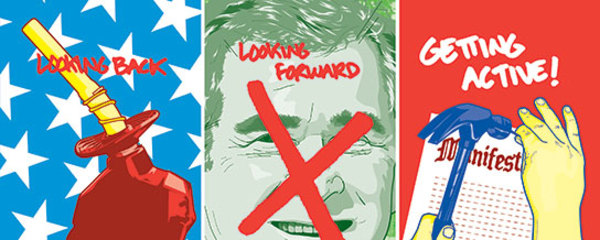AlterNet: Sense And Nonesense
In the aftermath of the 2004 election, countless scribes have performed autopsies on the Democratic […]
AlterNet: Sense And Nonesense
In the aftermath of the 2004 election, countless scribes have performed autopsies on the Democratic […]

In the aftermath of the 2004 election, countless scribes have performed autopsies on the Democratic body politic–unfortunately they’ve emerged with a message that’s about as coherent as John Kerry’s vision for a New America. AlterNet‘s Start Making Sense:Turning the Lessons of Election 2004 Into Winning Progressive Politics (softcover; Chelsea Green Publishing, $12), edited by Don Hazen and Lakshmi Chaudhry, attempts to better address the myopia that has blindsided Democrats and progressives alike.
Taking a more pragmatic approach than the majority of post-2004 election books, Start Making Sense compiles interviews and essays from some of the brightest minds in the progressive camp. AlterNet bills itself as an “infomediary;” since 1998, it has served as a warehouse where one can find articles from the alternative press as well as valuable resources for grassroots organizing.
The book is organized into three sections–”Looking Back,” “Looking Forward,” and “Getting Active”–and includes analysis from people like Naomi Klein, Thomas Frank, and MoveOn.org co-founder Wes Boyd, among others. Take the example of Adam Werbach who, at 23, became the youngest president of the Sierra Club and who co-founded the Apollo Alliance, an organization devoted to ending US dependence on foreign oil. After the election, Werbach composed a November 3rd thesis and, in homage to Martin Luther, nailed his manifesto of grievances to the door of the Democratic National Committee headquarters in Washington D.C. As he states: “When the Senate Democratic leader is defeated while spending $16 million to get the majority of 500,000 votes, the problem is not a lack of funding or effort.”
While the book includes diverse perspectives, a common theme is that the Democrats have little chance of success if they continue to pursue their current poll-driven, top-down managerial strategy–a strategy that has little connection to the Democrats’ historically grassroots base and offers nothing in terms of vision other than an anti-Bush platform.
A typical critique comes from commentator and California gubernatorial candidate Arianna Huffington. She argues that Kerry and his advisors drove his operation “straight over the edge of the Grand Canyon” by abandoning the tough language he used early in the campaign, when lambasting those “Benedict Arnold corporations” who outsource labor and hide their profits in tax shelters overseas. She believes that a cautious strategy designed to appease Wall Street and not alienate “swing voters” is a prescription for failure.
While Kerry’s capitulation is cause for despair, what sets Start Making Sense apart is its inclusion of activist success stories. Markos Moulitsas Zúniga, a child refugee survivor from war-torn El Salvador and US Army vet, helped jumpstart the blogging revolution with DailyKos.com, a meeting site for activists who have helped organize against behemoths like the Sinclair Broadcast Group’nc. On the eve of the election, Sinclair ordered its numerous television stations to air an anti-Kerry documentary. By targeting the station’s advertisers, the bloggers forced the station to produce a more balanced documentary.
Start Making Sense makes it clear that the 2004 election has provided progressives with a mandate to get actively involved in changing the direction of the country. Whether it’s lobbying for voter machine reform, participating in the anti-war movement or starting your own activist organization, now is the time for a creative re-envisioning of possibilities. The book’s last section provides provocative suggestions on how to accomplish this.
Start Making Sense concludes with Barack Obama’s impassioned speech at the Democratic convention. In the address, he says: “It is that fundamental belief-I am my brother’s keeper, I am my sister’s keeper-that makes this country work.”

